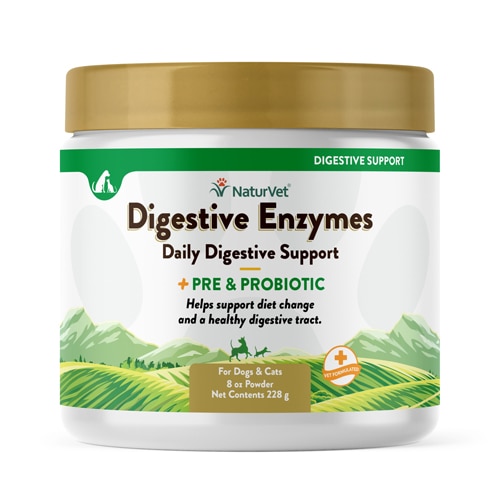Oh, how we try to eat the right things all the time; but just as we can be missing out on key vitamins and nutrients in our own day-to-day diets, so, too, can our beloved, four-legged family members.
Think about it: We put an awful lot of stock in feeding our feline and canine companions the same food, day in and day out. While we know that for us, eating a diverse, nutrient-rich diet is one of the keys to maintaining a healthy lifestyle. And, where we lack, we can seek to make up for certain dietary indiscretions via implementing a daily vitamin and supplement regimen.
In addition to regular exercise, grooming and lots of love, many of us go to great lengths to make certain our pets are eating well-balanced diets, too. Some are advocates of raw diets, while many others cook their pets special protein and veggie-packed meals.
And, though there are some phenomenal organic dog food and grain-free cat food formulations on the market, it stands to reason that finicky, aging pets or those with digestive, skin or other health issues could benefit from certain supplementation.
For years, holistic and integrative veterinary practices have recommended special diets and, wherein there may exist dietary gaps, nutritional supplements to their patients. Of course, consulting with your family vet before changing food or adding anything to your pet’s diet is always recommended.
But if you’ve been considering making the transition to a greener lifestyle for your favorite furry friend, we invite you to read on to learn about five of the top supplements for pets.
1. Multivitamins
Much like their own entrée into the vitamin market, for many dog owners one of the first supplements that piques their curiosity is a daily multivitamin. If your dog is one of the aforementioned picky eaters and/or potentially lacking in certain key vitamins, a canine multivitamin is a great way to ensure he or she is getting the proper nutritional balance they need to thrive.
As capsules or pills can sometimes be problematic in administering, consider employing a tasty, chewable variety to make them more palatable.
2. Probiotics
According to the Dr. Mercola website, “bowel health is one of the top 10 reasons owners bring their pets to the vet for health care.” And a great way to proactively head off some of those problems at the pass, is by adding a probiotic supplement to your cat or dog’s diet.
By introducing beneficial bacteria to the gastrointestinal tract, you can help your pet better fend off stressors that may affect the delicate balance of gut flora. If you’re looking to enhance your pet's immune system, optimize digestion, and give their overall health a boost, pet probiotics are a great place to start.
Omega-3 fatty acids
The American Heart Association recommends that we consume fatty fish that are high in omega-3 fatty acids, like salmon, mackerel, herring, lake trout, sardines or albacore tuna at least two times a week. For many years we’ve known that eating these types of fish as part of a well-balanced diet can be beneficial for both healthy individuals and those with heart disease. The same goes for our furry friends.
And if your pet is not on a diet which includes fish, it’s something you may want to consider. In addition to being good for the heart, these essential fatty acids can assist in maintaining a shiny, healthy coat, and help keep arthritis and other inflammatory conditions at bay.
Digestive enzymes
In addition to probiotics, another great way to keep your cat or dog’s digestive system humming right along is with the introduction of a digestive enzyme supplement for pets. To that end, many enzyme supplements may have the added benefit of including probiotics in their formulations.
Older dogs, those that are easily stressed, taking certain medications or consume high-glycemic foods may have difficulty producing enough of their own enzymes—this is where pet digestive enzyme supplements can really help. As always, do your research and check with your vet first, but some other great ways to bolster your pet’s enzymatic intake are to consider adding things like raw dairy, kefir, coconut water and papaya to their diet.
Glucosamine and chondroitin
Just like us, our pets are amazingly complex beings. As varied as the many breeds that exist are the health challenges they may encounter as they age. Certain breeds, such as Old English Sheepdogs, German Shepherds, Labs, Rottweilers and others, are predisposed to having particular ailments, such as arthritis or hip dysplasia as they get older.
Where these sometimes painful, joint-related problems arise, a pet supplement with glucosamine and chondroitin, known as chondroprotectives, can be immensely helpful. In combination, these supplements are widely hailed as having properties which can help to ease joint narrowing, inflammation and pain, while stimulating cartilage production. So, if you want to keep your pet active well into his or her senior years, this is another great supplement to consider.




